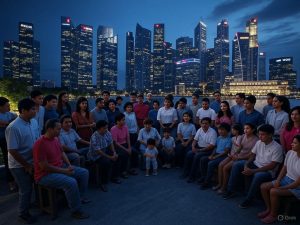Washington, DC, May 15, 2025 — Singapore’s economy demonstrated a robust recovery in 2024, with growth reaching 4.4 percent, up from 1.8 percent in 2023, according to the International Monetary Fund (IMF) following its 2025 Article IV Consultation. Led by Mr. Masahiro Nozaki, the IMF team concluded its mission on May 15, 2025, praising the city-state’s fiscal and monetary policies while noting a cautious outlook for 2025.

Fiscal and monetary policies are appropriately supporting the economy. Singapore has ample fiscal space to provide additional temporary and targeted support in case downside growth risks materialize.
Singapore’s financial sector remains sound and resilient, underpinned by well-capitalized and liquid banks. Potential financial sector risks from tightening global financial conditions should continue to be closely monitored.
The recovery, driven by a global technology upturn, saw inflation drop to 1.5 percent by the end of 2024 and further to 0.9 percent in March 2025. However, escalating global trade tensions have clouded the horizon, with growth projected to slow to 1.7 percent in 2025. Inflation is expected to remain low at 1.1 percent, supported by declining commodity prices and economic slack.
Despite the slowdown, Singapore is well-equipped to navigate uncertainties. The Monetary Authority of Singapore (MAS) has wisely loosened monetary policy in January and April 2025, with potential for further easing to bolster growth. The government’s expansionary fiscal policy for FY2025, including support for households, firms, and infrastructure, offers a safety net. With ample fiscal space, Singapore can deploy targeted support if global risks intensify.
The nation’s financial sector remains a strength, with well-capitalized banks and effective regulation mitigating vulnerabilities from global financial tightening. Continued vigilance is recommended to address potential risks in real estate and cross-border exposures.
Singapore is also advancing social initiatives under the Forward Singapore plan, enhancing parental leave, housing affordability for low-income buyers, and retirement support. Temporary aid for the unemployed and efforts to reskill workers and adopt AI technology further bolster its resilience.
“The authorities have laid a solid foundation to weather global uncertainties,” Mr. Nozaki stated. “Singapore’s proactive policies and strong institutions position it well for the future.”
The IMF’s full report, pending Executive Board approval, will provide deeper insights into Singapore’s economic strategy.
Source: IMF Press Release, May 15, 2025




